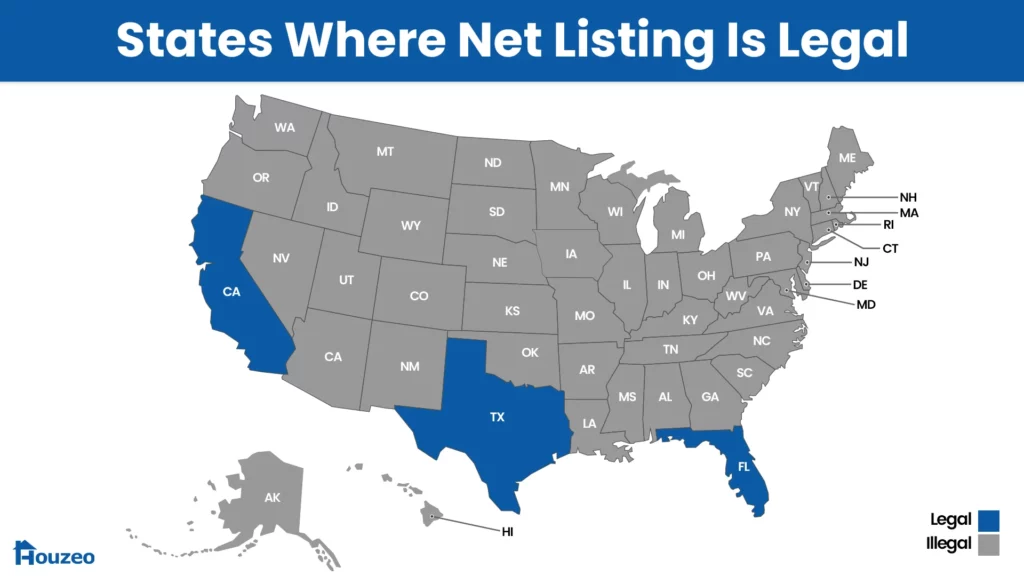In October 2024, 27.8% of sellers sold their homes for a valuation that was more than the listing price. Nevertheless, imagine you don’t know your home’s worth and your agent deliberately undervalues it.
Shocking as it may seem, this is exactly what a net listing agreement does. It traps you in an agreement wherein even your agent doesn’t prioritize your benefit. Needless to say, net listing is illegal in 47 states + DC!
What Is a Net Listing?
A net listing agreement is a deal where a seller and an agent fix the home’s listing price or the “net price”. When you sell your house, you receive only this net price. Any amount earned above this price goes to your agent as their fee.
It is technically right to think that opting for a net listing secures a preset amount you expect to earn from the sale. Nevertheless, you should be weary of the immediate trap such agreements can catch you in.

The Trap: Agent Before Client
If you choose net listing, you walk into these major traps:
- You are limited to one agent who is prone to manipulate the process of selling your house.
- Your agent will try to fix a net price that is below your home’s Fair Market Value (FMV).
- This agent will then market the house and overprice it.
- A valuation above the home’s FMV will either fool the buyers to pay more or discourage them from purchasing the house.
Understanding Net Listing: Example
Picture you opt for a net listing and agree upon a net price of $300,000. Here’s how the proceeds are distributed when it is sold for more than the net price:
| Type of Listing | Selling Price | Your Earning | Agent’s Earning |
| Net listing | $400,000 | $300,000 | $100,000 |
| Other types of listing | $400,000 | $376,000 | $24,000 |
Net listings guarantee the agent a larger share when your home sells for more, as they keep everything above the agreed price. Other listing types, in contrast, ensure your earnings increase with a hike in the selling price, leaving less to the agent.
Why Is Net Listing a Violation of Fiduciary Duties?
Real estate brokers have a legal obligation to place their client’s interests above their own. However, net listings create a conflict of interest. This is because it rewards agents based on how much more the property sells for beyond the agreed price.
Net listings benefit agents disproportionately. The buyer pays more and the seller loses profit, undermining the agent’s obligation to secure the best possible outcome for their client. This is how a net listing violates the core principles of fiduciary duty.
What Are the Pros and Cons of Net Listing?
✅ Pros
- Guaranteed Net Price: You receive the promised net price. If the deal closes at an amount less than the net price, your agent will make up for your loss.
- Agent Determination: The agent has the motivation to use aggressive marketing and negotiation strategies to sell your house. After all, their earning depends upon your home’s sale price.
- Quick Sale: The time-bound nature of this agreement means the sooner an agent closes a deal, the faster they get paid.
❌ Cons
- Limited Agency: You cannot consult multiple agents to sell your house. Your agent has the exclusive right to get you buyers.
- Conflict of Interest: Your agent might prioritize a higher commission and not your best interest.
- Legal Concerns: It is illegal in 47 states. The 3 states where it is legal have strict laws to ensure that the deal is in the seller’s best interest.
- Lack of Realtors: Realtors registered with NAR cannot do net listings.
- Time-Bound Contract: Net listings can only be terminated after the contract expires or the property has been sold.
- Less Exposure: Net listings don’t make it to the Multiple Listing System (MLS) and hence get less exposure. Most of these homes sell at or below the listing price.
What Are the Preventive Measures?
Here are some preventive measures to protect sellers from the trap of net listing agreements:
1. Legal Prohibitions on Net Listings
Given the exploitative tactics of agents, real estate net listings are illegal in 47 states + DC. Nevertheless, they are legal in 3 states. However, there too, net listings are subject to heavy regulations:
- Florida: A qualified Florida real estate attorney must represent you. The agreement is legally binding only if an attorney is involved.
- Texas: An agent can involve you in a net listing agreement only if you have in-depth knowledge of your home’s market value. It also mandates that you choose a net listing only if it is the best available option.
- California: Your agent can close the deal only if you agree upon the selling price of your house. Furthermore, agents can suggest net listing only if a legal or real estate advisor represents you or if you own a unique property.

2. The NAR Ban
The National Association of REALTORS® has banned all its members from making net listings, intending to discourage sellers’ exploitation. Moreover, net listings are banned from the MLS. This means your property gets less exposure and fewer offers.
Alternatives to a Net Listing Agreement
A net listing agreement should always be the last option for you to choose from. Here are some other types of listing agreements you can consider:
| Type of Listing | Key Features |
| Exclusive Right-to-Sell Listing Agreement | 1. A single agent has the sole right to list, market and sell your property via the MLS. 2. You pay a commission to the agent even if you find the buyer yourself. |
| Open Listing Agreement | 1. Multiple agents can list, market and sell your property via the MLS. 2. You pay a commission to the agent who brings you the buyer. 3. You don’t pay a commission if you find the buyer yourself. |
| Exclusive Agency Listing Agreement | 1. A single agent has the sole right to list, market and sell your property via the MLS. 2. You don’t pay a commission to the agent if you find the buyer yourself. |
Should You Use a Net Listing to Sell Your Home?
Ideally, the answer is no. Net listings may be legal where you live, but they tend to push your best interests aside. Moreover, the time-bound and exclusive nature of the agreement makes net listings even more undesirable.
But why go through the hassle, when you could simply list on the MLS for a Flat Fee? Not only do you retain full control over the sale, but all of your profits too! Houzeo helps you get on the MLS within 48 hours – don’t keep buyers waiting.
Frequently Asked Questions
What is a net listing in real estate?
A net listing agreement is a deal between a seller and an agent which fixes the base amount to sell a house. The seller receives this amount on the sale of a home. Anything above this price becomes the agent's earning.
Why is net listing illegal?
Net listing agreements bring up a conflict of interest between the agent and the seller. Agents deliberately undervalue the property to pocket the profits. This violates the Fiduciary Duties, making the practice unethical.
Where is net listing legal?
Net listing is legal in just 3 states. They are Florida, Texas, and California. This is done to protect the interests of sellers. Furthermore, in the three states where net listing is legal, it is regulated strictly.
What are the alternatives to a net listing agreement?
There are 3 more types of listing agreements. They are - open listing, exclusive agency listing and exclusive right to sell listing agreements.
















